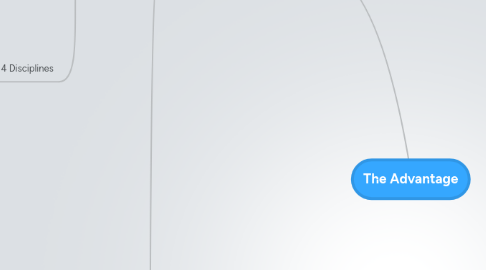
1. Great companies need to embody two basic qualities...
1.1. Health
1.1.1. Means...
1.1.1.1. The org has integrity (health) which means its whole, consistent, and complete
1.1.1.2. Minimal politics, minimal confusion, high morale, high productivity, low turnover
1.1.2. Needs us to...
1.1.2.1. Be disciplined, have courage, persistence, and common sense
1.1.2.2. Slow down to go faster
1.1.2.3. Accept that qualitative measures will be needed over quantitative to feel the impact
1.1.3. Requires 4 Disciplines
1.1.3.1. Build a Cohesive Leadership Team
1.1.3.1.1. Need to overcome The Five Dysfunctions
1.1.3.1.2. Put collective priorities and needs of entire organization above all else
1.1.3.1.3. Small group collectively responsible for achieving a common objective
1.1.3.1.4. Need not necessarily have the right answer, but rather be able to rally around the best answer they can find at the time.
1.1.3.2. Create Clarity
1.1.3.2.1. The Six Critical Questions
1.1.3.2.2. Meaning
1.1.3.2.3. The Playbook
1.1.3.3. Overcommunicate Clarity
1.1.3.3.1. No such thing as too much communication
1.1.3.3.2. When done right the employees are regularly reminded about the company's reason for existence, its core values, its strategy, and its top priority. In meetings where decisions have been made, the last thing is always to establish clarity about what was agreed and how it should be communicated to those absent. Also, concerns and ideas are sought out from everyone for use when decisions need to be made.
1.1.3.4. Reinforce Clarity
1.1.3.4.1. A few critical, non-bureaucratic systems to reinforce clarity in all processes that involve people
1.1.3.4.2. There need to be simple, practical processes for recruiting, hiring, and orienting the right people based on the core values.
1.1.3.4.3. People's performance needs to be managed around the organization's most important priorities.
1.1.3.4.4. Training and rewards (if any) need to be based not the company's culture, strategy, and operations.
1.1.3.4.5. Design and development of these human systems must be driven by the people who set the direction for the organization and have authority to guard against the bureaucracy that turns a useful human system into an administrative distraction.
1.1.3.4.6. Direct, informal recognition needs to be given as soon as something really worthy of recognition has been done by an employee or employees!
1.2. Smarts
1.2.1. Finance, strategy, marketing, technology = Decision sciences
